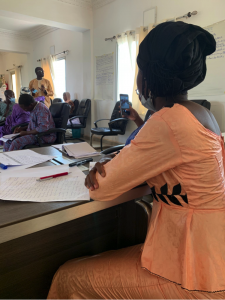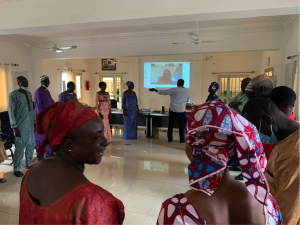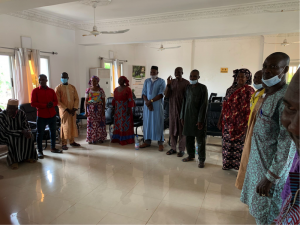Co-FARM team members convened a semi-virtual stakeholder engagement event on July 9, 2021 at the offices of Association Malienne d’Éveil au Développement Durable (AMEDD) in Koutiala, Mali. The purpose of this event was to update the community on the experiences with the BCERs (Bassin de Collecte des Eaux de Ruissellement) that are the focus of the Co-FARM project, as well as other BCERs in the region of Koutiala and surrounding areas. The meeting brought together a total of 28 people, 23 of whom were in-person and 5 who joined online via Zoom. The participants came from diverse groups including traditional authorities, local officials, women’s groups, NGOs, local radio and more.
During the meeting, participants voiced their desires to learn more about improving the functioning of the Co-FARM BCERs, promoting access to the BCERs by different groups, and opportunities for livelihoods activities linked to the basins (e.g. market gardening, fish farming , watering animals and fruit trees). The Co-FARM student researchers had an opportunity to present their research to the audience which linked to a number of these themes.
Lively discussions occurred around potential futures of the BCERs, challenges that might be faced for achieving those futures and actionable strategies for useful activities linked to the BCERs and their management. This exchange will inform the Co-FARM project’s next steps around co-exploring possible interventions to improve the usage of the irrigation water during the time it is present (what vegetables or trees to plant during this period), to extend its presence (for example by using cement to waterproof the basins) and how to do so by building on local resources and contributions beyond the life of the project.

From 2014-2018, START and our regional partners worked with stakeholders to explore options for bolstering supplemental irrigation in Koutiala, Mali as part of the Adaptation at Scale in Semi-Arid Regions (ASSAR) project, one of four projects of the Collaborative Adaptation Research Initiative in Africa and Asia (CARIAA). Near the end of the ASSAR project, two runoff catchments called BCERs (Bassin de Collecte des Eaux de Ruissellement) were constructed in 2018 in the district to test their use for irrigation. Today, START is partnering with the Rural Polytechnical Institute for Training and Applied Research (IPR/IFRA) in Katibougou, Mali, the Association Malienne d’Éveil au Développement Durable (AMEDD) in Koutiala, Mali and ReosPartners (South Africa) on the Collaboration For Adaptation and Resilience in Mali (Co-FARM) project to reconvene stakeholders and key development partners around the shared use of the BCER resources. The main objective is to increase the resilience and adaptive capacities of the BCER water resource users in Koutiala. The project team also comes with a focus on co-design, shared visioning and capacity strengthening for young Francophone researchers who are part of the project team.





